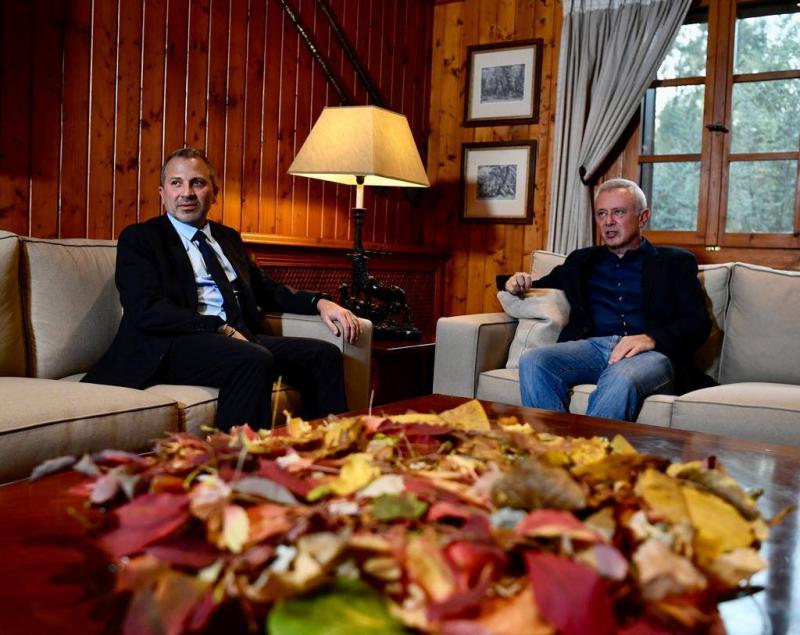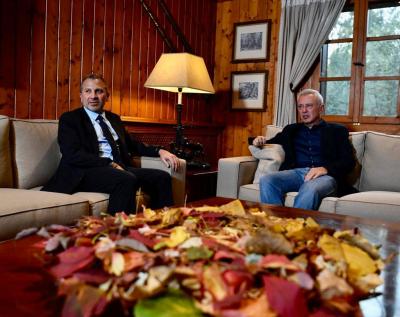After his meeting with the head of the "Free Patriotic Movement," Deputy Gebran Bassil, in Bnachii, the head of the "Mardah Movement," Sleiman Franjieh, confirmed that "Lebanon is more important than the presidency," stating: "We spoke about the country's issues, and we are largely in agreement. We affirmed our commitment to the country, and the resistance has shown its dedication to Lebanon, and I cannot claim to care for Lebanon more than Parliament Speaker Nabih Berri and Secretary-General of Hezbollah, Sayyed Hassan Nasrallah, do. Bassil is with us, and we must work to prevent division. Reality is approaching our wishes, and what is happening in Palestine and Gaza is a crime against humanity."
For his part, Bassil noted that "there is a significant understanding regarding the various ideas discussed about how to unite in the face of the danger of war and to work collectively to restore order to institutions." He expressed his "happiness at Franjieh's visit," stating: "In these circumstances, we transcend barriers, and I found a responsive reaction to the ideas I proposed."
In this context, Gebran Bassil, after meeting with the "National Moderation Bloc" on Wednesday morning, asserted that "any idea in the country will not succeed if any team is excluded," emphasizing that "it is impossible to elect a president of the republic without ensuring the participation of all national components."
Subsequently, the "basis" delegation met with the head of the "Dignity Movement," Deputy Faisal Karami, and members of the "National Consensus Bloc": Taha Najy, Hassan Murad, Muhammad Yahya, and Adnan Traboulsi, accompanied by members of the "Strong Lebanon" bloc, deputies Jimmy Gabbour and Sherbel Maroun.
For his part, Karami affirmed that "there are no taboos with the enemy, and this creates a deep wound in public opinion that may last for years. We hope that officials will put an end to the Zionist killing machine." He added: "Secondly, as Lebanese, we must seize the opportunity, as we are masters of wasting opportunities; we must grasp this chance to remedy the internal situation amid the threats that are present, not on our borders, nor in Palestine, but within Lebanese territories. We are suffering daily casualties and are subjected to Zionist bombardment, and Israel is violating all international norms and agreements. Therefore, we must unite our ranks in facing this crisis."
In turn, Bassil said: "Of course, today, within this consultative tour, and representing Faisal and the parliamentary team, I would like to start from what he mentioned; we do not seek war nor do we want it. There is something we can prevent, and there is something beyond our control. What does Israel want to do? That is its decision. If it attacks us, we defend ourselves, but what can we do from Lebanon? This is a decision we can all agree on, and at that point, we will create sufficient national awareness to understand what we can prevent and what our capacity is to mitigate harm to the Lebanese."
He continued: "This is the effort to try to prevent Lebanon from being drawn into war, without fearing it if it is imposed on us, and without resigning ourselves to the belief that as Lebanese we cannot do anything. No, we can do a lot. At the very least, in our internal issues, we can return to order in the functioning of institutions, reconstitute authority, elect a president, and form a government. This is something that none of us can hinder, and we should not submit to waiting as if we cannot do anything. Our initiative is an attempt to gather the Lebanese around this idea, not to concede and wait, but to strive for understanding, because understanding and national unity are what will save Lebanon in the face of threats to us."
Bassil had met yesterday with the former head of the "Progressive Socialist Party," Walid Jumblatt, and the Speaker of Parliament, Nabih Berri, as part of his consultative tour of different political forces.




